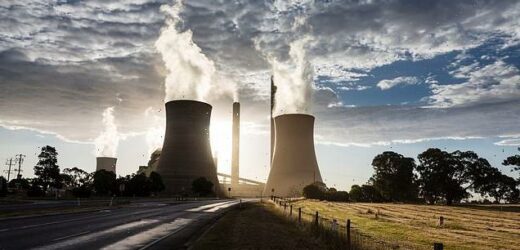‘We already have enough extractable fossil fuels to cook the planet’: First public database of coal, oil and gas production reveals burning the world’s reserves would unleash 3.5 TRILLION tonnes of greenhouse gas emissions
- UN estimates Earth’s remaining carbon budget to be 360 billion tonnes of CO2
- US and Russia each hold enough fossil fuels to blow entire global budget
- Burning world’s remaining reserves would unleash 3.5tn tons of GHG emissions
- New Global Registry of Fossil Fuels aims to make this data publicly available
Burning the world’s remaining fossil fuel reserves would blow the carbon budget seven times over.
That is the key finding of the new Global Registry of Fossil Fuels – a first-of-its-kind database for tracking the world’s fossil fuel production, reserves and emissions.
The United Nations estimates that Earth’s remaining carbon budget – the amount of pollution we can add to the atmosphere before the 1.5°C (2.7°F) temperature goal of the Paris Agreement is missed – to be around 360 billion tonnes of CO2 equivalent.
However, the Global Registry reveals that the US and Russia each hold enough fossil fuel reserves to blow the entire global carbon budget, even if all other countries ceased production immediately.
Moreover, burning the world’s remaining fossil fuel reserves would unleash 3.5 trillion tons of greenhouse gas emissions, which is more than all of the emissions produced since the Industrial Revolution.
‘We already have enough extractable fossil fuels to cook the planet. We can’t afford to use them all – or almost any of them at this point,’ said Rob Jackson, a Stanford University climate scientist.
‘We’ve run out of time to build new things in old ways.’
The United Nations estimates that Earth’s remaining carbon budget – the amount of pollution we can add to the atmosphere before the 1.5°C temperature goal of the Paris Agreement is missed – to be around 360 billion tonnes of CO2 equivalent
Chart maps fossil fuel emissions against their profitability and location in terms of GDP per capita. Coal clusters in the bottom left, reflecting its lower profitability and concentration in lower income countries. Oil producers cluster along the top of the chart, as oil continues to provide far greater profits per unit of energy than either gas or coal, while OECD fossil fuel production (bottom right) is characterised by relatively low profitability.
Shell and BP’s plans to reduce carbon emissions will still overshoot the 1.5°C warming limit
Fossil fuel companies’ plans to reduce carbon emissions will still overshoot the 1.5°C warming limit in the Paris Agreement by a ‘significant margin’, a new study warns.
Researchers have studied the ‘decarbonisation scenarios’ outlined by vast energy companies Shell, BP and Equinor.
These scenarios are intended to predict future energy requirements, and what energy sources would be needed to supply them, in order to estimate resultant emissions.
Researchers claim that all the energy firms’ decarbonisation scenarios show ‘delayed reductions in fossil fuel consumption’ and run the risk of ‘overshooting vital climate goals’ laid out in the Paris Agreement.
Adopted in 2016, the Paris Agreement aims to hold an increase in global average temperature to below 2°C (3.6°F) and pursue efforts to limit the temperature increase to 1.5°C (2.7°F).
But decarbonisation scenarios produced by BP, Shell and Equinor are ‘incompatible’ with these goals for a safe and habitable planet, according to the study, and could lead to ‘catastrophic impacts’.
Human activity since the Industrial Revolution, largely powered by coal, oil and gas, has led to just under 1.2°C (2.1°F) of warming and brought with it ever fiercer droughts, floods and storms supercharged by rising seas.
The registry, developed by Carbon Tracker and Global Energy Monitor, includes data from over 50,000 oil, gas and coal fields in 89 countries – covering 75 per cent of global reserves, production and emissions.
It aims to make previously disparate or hard-to-access data publicly available, including to investors attempting to better understand which assets could be at risk of being uneconomical, or ‘stranded’, in the low-energy transition.
It could also help activists in their efforts to pressure producers or governments to cut fossil fuel output.
Of the 50,000 fields covered by the registry, the most potent source of emissions is the Ghawar oil field in Saudi Arabia, which produces approximately 525 million tons of carbon emissions each year.
The top 12 most polluting sites are all in the Gulf or Russia, according to the database.
Meanwhile, US coal reserves embed 520 billion tonnes of CO2 equivalent, and China, Russia and Australia all hold enough reserves to miss 1.5°C.
The registry also highlights large variability in the price of carbon between countries, with taxes on emissions generating nearly $100 per tonne in Iraq but just $5 per tonne in Britain.
‘The Global Registry will make governments and companies more accountable for their development of fossil fuels by enabling civil society to link production decisions with national climate policies,’ said Mark Campanale, founder of Carbon Tracker and Chair of the Registry Steering Committee.
He said he hopes the investment community will use the data to begin to challenge the investment plans of companies still planning to expand oil, gas and coal projects.
‘Companies like Shell and Exxon, Chevron and their shareholders can use the analysis to to really begin to try and push the companies to move in a completely different direction,’ he added.
The UN’s annual Production Gap assessment last year found that governments plan to burn more than twice the fossil fuels by 2030 that would be consistent with a 1.5°C world.
The launch of the Global Registry of Fossil Fuels coincides with climate talks taking place at the United Nations General Assembly in New York today.
Inger Andersen, Under-Secretary-General of the United Nations, said: ‘The science is crystal clear. The transition away from fossil fuel powered economies is critical to the survival of people and the planet.
‘For this to happen we need to deploy every solution in our toolbox to decarbonise our economies.
‘The Global Registry of Fossil Fuels is an important step in providing insights to policymakers and investors as we embark on a just transition away from fossil fuels.’
Climate change impacts are heading into ‘uncharted territory of destruction’
The bleak words of the UN’s secretary general António Guterres (pictured) come as the annual ‘United In Science’ report is released that sets out the scale of the climate crisis
Climate impacts are heading into ‘uncharted territories of destruction’, the head of the United Nations (UN) has warned.
The bleak words of the UN’s secretary general António Guterres come as the annual ‘United In Science’ report is released, setting out the scale of the climate crisis.
The report details how greenhouse gas levels – largely carbon dioxide from burning fossil fuels – are continuing to rise.
They were higher at the start of this year than before the pandemic, which saw a temporary drop in emissions due to lockdowns around the world.
Coordinated by the World Meteorological Organisation (WMO), the United In Science report compiles the most recent science related to climate change, impacts and responses.
This year’s data reveals that the world is experiencing increasingly high global temperatures and destructive climate-driven floods, droughts and heatwaves.
‘Without ambitious action, the physical and socioeconomic impacts of climate change will be devastating,’ it warns.
Source: Read Full Article





